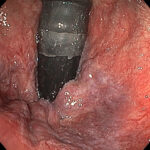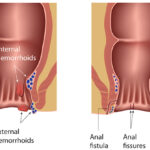Haemorrhoids and Anal Fissures Treatment
Haemorrhoids are swollen veins in the lower rectum or back passage (anal canal). Everyone has these veins, but it is only when they become enlarged or irritated that they cause symptoms. The most common symptoms of haemorrhoids are rectal bleeding, itching, and pain. You may be able to see or feel haemorrhoids around the outside of the anus, or they may be hidden from view, inside the rectum. Haemorrhoids are classified as internal (arising from inside the rectum) or external (arising from the anal canal or outside).
Anal fissures are tears or splits in the lining of the back passage (anus) and often occur because of constipation, straining or hard stools. Common symptoms of anal fissures are stinging, burning or tearing pain when passing a bowel motion, often associated with bleeding and subsequent throbbing or itching. This then sets off a cycle of pain and muscular spasm of the anus which makes it harder to goto the toilet and reduces blood supply to the anus which can prevent healing of the fissure.
Haemorrhoids and anal fissures are common, occurring in both men and women. Although they do not usually cause serious health problems, they can be annoying and uncomfortable and the symptoms they produce (particularly bleeding) can mimic those of more serious bowel problems. When conservative therapies have failed, endoscopic treatments like banding, injection or botox can be effective.
Haemorrhoid banding or injection
Rubber band ligation (banding) or injection of internal haemorrhoids are highly effective therapies that can be performed at the time of Sigmoidoscopy or Colonoscopy.
Banding involves suctioning the haemorrhoid into a ligator device and then applying a band around its base. This leads to thrombosis of the haemorrhoid and development of local scarring that allows the haemorrhoid to retract.
Injection of internal haemorrhoids with a highly concentrated salt solution (hypertonic saline) causes a local inflammatory reaction which allows the vein to collapse down and retract. The procedure is done under direct vision using an endoscopic injector rather than using an external needle and proctoscope. This allows more accurate injection and the use of smaller doses of hypertonic saline, meaning there is less post procedure discomfort.
If haemorrhoids are large banding or injection may need to be repeated to get the best outcome.
Anal fissure therapy
Conservative treatment of anal fissures is by ensuring bowel motions are soft, avoidance of straining and use of a foot stool in the toilet. Application of creams like rectogesic aid with healing. If the fissure persists despite these measure then endoscopic therapy can help. These include gentle dilation with a proctoscope or botox injection to the internal anal sphincter.
Specialised services provided
Colonoscopy to investigate symptoms and ensure serious bowel pathology (such as polyps, colitis or cancer) is not responsible
Endoscopic treatment of haemorrhoids with:
- Rubber band ligation (Banding)
- Hypertonic saline injection
Treatment of anal fissures with:
- Botox injection
- Gentle anal dilation
Conservative management advice including appropriate fibre and toileting regimens, topical ointments and salt baths.


